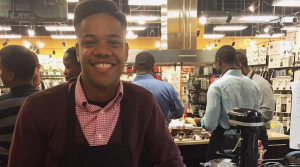


By Isaac Butler
The stories we’re told shape the way we see the world.
The stories we tell shape how others see the world.
These stories have power in ways that are hard to judge. I want to tell you a story of the power of these stories, of how we carry around stories without even realizing it.
I am a White man who makes my living working for an anti-discrimination research consortium (the very one who’s website you’re currently browsing). I have two African American siblings. My parents campaigned for civil rights. I went to the first integrated school in Washington.
I am, in other words, about as primed as a White guy can be to believe in fairness and equality. Not only is my life story one spent entirely in left-wing, pro-equality environments, but I currently have a financial incentive to view the world in a particular way.
I say all of this because I want you to understand how powerful stories are when I tell you that my initial reaction when I read about the horrific beating of UVA student Martese Johnson was well, the police say he was drunk and belligerent. I felt this even while reading an article that noted Virginia Governor Terry MacAuliffe wanted the police investigated for use of excessive force.
I thought this, you might say, without thinking it. It appeared, in my mind, already thought out, unfurling like the smoke from a guttering candle in a dimly lit room.
How did I end up in this room? And who lit that candle? How did all this smoke get here, obscuring my ability to clearly see the world for what it is, to see police brutality, to see the ways that we over-police the lives of Black men and the depressing, inevitable results of doing so?
And who built that room with its dated décor and its malodorous candles anyway?
In Seeing Race: Race, Crime, and Visual Processing, co-authored by our research advisor Phillip Atiba Goff and MacArthur Genius Award winner Jennifer L. Eberhardt alongside Paul G. Davies and Valerie J. Purdue, the authors devised a series of tests to show how strong the link is between Black men and stereotypes of criminality in our mind.
What they found is that this link is very strong. So strong, in fact, that it’s “bidirectional,” meaning that people associate Black men with crime and crime with Black men. If you subliminally show people images of Black men, they will recognize images of crime-related objects faster. If you subliminally show people crime-related objects, they will pay more attention to Black male faces.
Many of us carry a story with us. We’re not sure where we learned it. And consciously, we don’t really believe it. But we carry it anyway, even if we’re well meaning, even if we’re actively engaged in battling racism. Even, in some cases, if we aren’t White.
That story tells us that Black men are criminals. It’s a story powerful and pervasive enough that even someone as predisposed against it as myself hears it in his ears as he reads the news.
Often, when we learn this, what we want to do is purge ourselves (and others) of this story. While that’s a worthwhile goal, the question remains what we’re supposed to do in the meantime. What we’re talking about here, after all, is the unconscious, and automatic mental processes. The whole point is that they operate on their own, and are hard to control.
The question then isn’t only how do we get rid of this story? It’s also what do I do with this story?
We cannot live in a world where we are always perfect and think perfect things. What we can do is engage in slow thinking. We can distrust that initial reaction, that guttering candle, that whole room. We can ask what other rooms are available to explore, ones where the lighting is better and the decorating is more up to date.
We can, in other words, use conscious thought to override our unconscious mind. We can interrogate the initial snap judgment. We can think slower, and think better. We can ask ourselves why? Why did I think this? What caused me to think this? What do I know and not know about this situation, this young man, these cops? We can choose to extend empathy, and to both re-see and rethink our assumptions about the world, and race, and each other.
We have to, because the other option is to keep living in that room as it gets darker, and more filled with smoke, and we find it harder and harder to breathe.